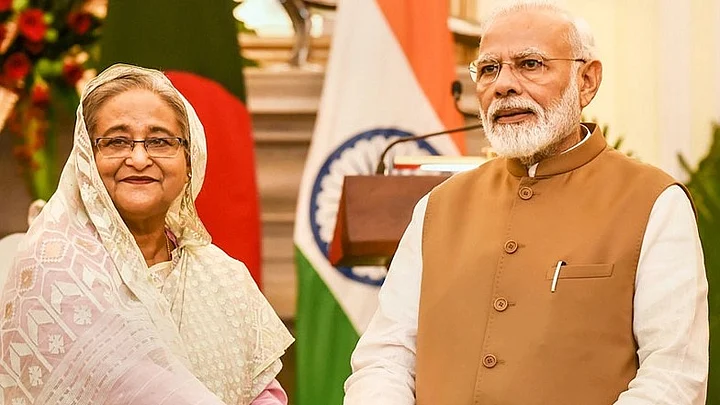India’s relations with Bangladesh, a nation rocked by student protests at the moment, appear to be improving. New Delhi recently gained the right to manage a terminal at Mongla Port, in addition to similar rights that India enjoys for the Chabahar Port in Iran and the Sittwe Port in Myanmar. The Mongla port will be managed by Indian Port Global Limited (IPGL) — a major win for Indian diplomacy vis-à-vis Chinese inroads in Bangladesh and the region.
India-Bangladesh relations have had momentum for quite some time now. Dhaka recently announced that while China was keen to undertake the 1-billion-dollar Teesta River Project, it preferred India.
In the words of Sheikh Hasina, “China is ready but I want India to do the project”.
China and India both had been vying for the project for a long time, but Hasina chose India, further emphasising that “If they (India) send a technical team and study the project, a final resolution of the Teesta River problem would be possible”. Only time will tell if this will prove fruitful in resolving the water-sharing issues between India and Bangladesh, a factor that has proven difficult to mitigate.
Bangladesh under Sheikh Hasina has successfully managed to balance its relations with India and China, but recently, there has been some unease between Dhaka and Beijing. During her July visit to China, Hasina cut short the trip by a day and returned earlier than planned, citing the ill health of her daughter. However, this led to a lot of speculation, and it is believed that she did not receive the expected coverage from the Chinese media.
The Chinese promise of just 100 million dollars as a loan compounded the issues. Beijing had initially indicated that it would be extending a loan of five billion dollars to Dhaka, but the final amount was nowhere close to this.
China, however, will continue to be involved in multiple projects. Bangladesh is a signatory to the Belt and Road Initiative (BRI) and has received a number of loans and investments from Beijing. Dhaka owes six billion dollars in external debt to China. On the other hand, India's 2024 Budget has allocated only 120 crore rupees to Bangladesh in foreign aid, a reduction of 40 percent from the last Budget.
But Hasina's visit to New Delhi was considered to be a major success. Both sides signed a number of deals and it was her second visit to India in less than 15 days (previously for the swearing-in ceremony of Prime Minister Narendra Modi). During her visit, India agreed to build and launch a small satellite for Bangladesh while Dhaka offered New Delhi two Special Economic Zones at Mongla and Mirsharai.
India also announced extending e-medical visas to Bangladeshi people. Promises to push for green and digital growth were also made. As per the MoU, “These will build a transformative collaboration between India and Bangladesh by leveraging green and digital technologies to foster economic growth, sustainable and climate-resilient development, environmental conservation, cross-border digital interchange, and regional prosperity”.
The differences in Hasina's visits to India and China are stark, and therefore, the decision about the Mongla Port is not a surprise. However, can this shift be sustained is squarely dependent on New Delhi. The Mongla Port and the Teesta River Project are both crucial for Bangladesh and for bilateral relations.
Dhaka has placed its trust in New Delhi and for the latter, this could be an opportunity to regain some of its lost centrality in South Asia and manage the criticisms surrounding its proactiveness towards the region.
After all, ports are crucial for China's geopolitical aspirations in South Asia. As of today, China is involved in 17 ports in the Indian Ocean Region and is constructing 13 of them. The current scenario, therefore, is still in Beijing’s favour. India’s proactiveness is essential.
(Dr Gunjan Singh is an Associate Professor at Jindal Law School, OP Jindal Global University. Her research interests are in the fields of Chinese Foreign Policy, China-South Asia Relations, Domestic Politics in China, Chinese Media, Mainland-Taiwan Relations and Space Security. This is an opinion piece and the views expressed are the author’s own. The Quint neither endorses nor is responsible for them.)
(At The Quint, we question everything. Play an active role in shaping our journalism by becoming a member today.)
